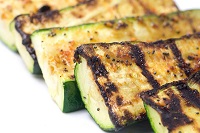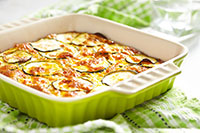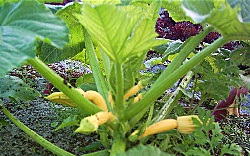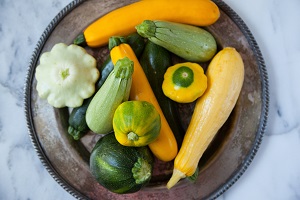Summer Squash - Cooking, Storage, & Gardening Tips
Fast Facts
- Squash is a highly nutritious low calorie food
- Choose squash that is small and tender, with glossy, brightly colored intact skin.
- Avoid extra-large squash with a dull appearance and a hard, tough surface.
Yellow squash is an excellent source of vitamin C as well as a good source of vitamin A. Vitamin C is an antioxidant that may reduce your risk of heart disease and certain cancers.
Summer squash also provides potassium, magnesium and fiber. Potassium helps maintain healthy blood pressure, magnesium helps build and maintain strong bones, and fiber helps control cholesterol and keeps you regular.
How to Properly Pick & Store Squash
Be sure to select small squash, which will be younger and therefore more tender and have thinner skins. The skins should be free of blemishes and have a vibrant color. Selecting the larger squash will sometimes yield rock-hard, tougher ones with inedible seeds and the less sweet flavor.
Once you have your squash, store it in a plastic bag in the crisper of the refrigerator. The entire squash can be eaten, so there’s no need to peel it. Even the blossoms are edible, either raw or cooked. Wash summer squash just before use.
Store at a cool (40 to 50 degrees F), moist (95 percent relative humidity) conditions for 5 to 14 days.
The Many Possibilities of Cooking Squash


There are so many ways to enjoy squash! You can eat it raw in salads and on sandwiches, but most people prefer cooked. It can be grilled, steamed, boiled, sautéed, fried, or even grated and used for breads. You can also use a spiralizer tool and make noodles with it! They mix well with onions, tomatoes, and okra in vegetable medleys. Different types of squash can be used interchangeably.
Summer Squash Gratin

- 6 Tablespoons olive oil
- 1 pound zucchini, cut into ¼-inch slices
- 1 pound yellow summer squash, cut into ¼-inch slices
- 1 teaspoon salt
- 2 medium onions, sliced
- 2 medium garlic cloves, minced
- 1 Tablespoon fresh thyme leaves, chopped fine or 1 teaspoon dried
- 4 large ripe tomatoes (1 ½ pounds), cut into ¼-inch slices
- 1 cup bread crumbs
- 2 ounces Parmesan cheese grated to about 1 cup
- Preheat oven to 400 degrees F. brush 13 x 9-inch baking dish with 1 tablespoon olive oil. Set aside.
- In a large bowl, toss zucchini and summer squash slices with 1 teaspoon salt. Transfer to colander set over bowl. Let stand for 30 minutes.
- In a 12-inch nonstick skillet over medium heat, heat 1 tablespoon oil until simmering. Add onions and cook, stirring occasionally, until onions are softened and dark golden brown.
- Press zucchini and summer squash slices between layers of paper towel to remove as much liquid as possible, then place zucchini and squash slices in a large bowl.
- In a small bowl, combine garlic, 3 tablespoons oil and thyme. Pour half of the mixture over zucchini and summer squash, toss to cover and then arrange slices in the greased baking dish.
- Arrange caramelized onions in even layer over squash. Layer tomato slices on top of onions. Spoon remaining garlic-oil mixture evenly over tomatoes.
- Bake until vegetables are tender, about 30 minutes. Combine bread crumbs, remaining tablespoon oil and cheese. Remove baking dish from oven and increase heat to 450ºF.
- Sprinkle breadcrumb mixture evenly on top of tomatoes. Bake until bubbling and cheese is lightly browned, 5 to 10 minutes. Yield: 10 servings
Nutrition Information per Serving: Calories-190, Fat-12 g, Sodium-470 mg, Carbohydrates-14 g, Fiber-2 g, Protein-7 g
Farmers Market Medley
- 2 onions, sliced into thin rings
- 3 cloves garlic, minced
- 1 medium eggplant, cubed
- 2 zucchini, cubed
- 2 medium yellow squash, cubed
- 2 green bell peppers, seeded and cubed
- 1 yellow bell pepper, cubed
- 1 red bell pepper, cubed
- 4 roma tomatoes, chopped
- 1/2 cup olive oil
- 1 bay leaf
- 2 tablespoons chopped fresh parsley
- 4 sprigs fresh thyme
- salt and pepper to taste
- In a large pot over medium low heat, heat one and one half tablespoon oil.
- Add onions and garlic and cook until soft.
- Remove the onion and garlic to a plate.
- Add remaining vegetables and sauté until slightly browned on all sides.
- Add the onions and garlic back to the pot.
- Season with salt and pepper. Add the bay leaf and thyme and cover the pot.
- Cook over medium low heat for 15 to 20 minutes.
- Add the chopped tomatoes and parsley to the large pot, cook another 10-15 minutes. Stir occasionally.
- Remove the bay leaf and adjust seasoning to your taste.
For more recipes download our Arkansas Foods Summer Squash publication
Gardening Tips
Warm soil is necessary for germination of seed and proper growth of plants. Plant seed directly in the garden after the danger of frost has passed and the soil has warmed above 62 degrees F in the spring. This is generally after April 1 in southern Arkansas, April 10-15 in central Arkansas and April 21-30 in northern Arkansas and at higher elevations.

Environment
- Light – sunny
- Soil – well drained
- Fertility – medium rich pH – 6.0 to 7.2
- Temperature – warm
- Moisture – average
Care
- Any well-drained garden soil produces excellent yields of summer squash.
- Squash plants are shallow rooted and require ample soil moisture at all stages of growth.
- For best yields, incorporate compost or well-rotted manure before planting.
- Fertilize the garden by broadcasting 2 pounds of 10-10-10 fertilizer per 100 square feet of garden and incorporate into the soil.
- If transplants are used, apply a transplant fertilizer starter at the time of planting. Mix one tablespoon of a soluble fertilizer high in phosphorus (i.e., 102010) into a gallon of water, and apply one cup of solution per plant.
- When treating the garden for insects and diseases, spray or dust during the late afternoon to avoid killing bees.
Common Problems
- Diseases – powdery mildew, blossom blight, bacterial wilt, complex virus
- Insects – cucumber beetle, squash vine borer, pickleworm, squash bug
- Cultural – blossom end rot (irregular moisture or calcium deficiency), flower dropping (may occur normally when female flowers form before male flowers or during periods of heavy fruit set)
For more information check out our Summer Squash Home Gardening page
